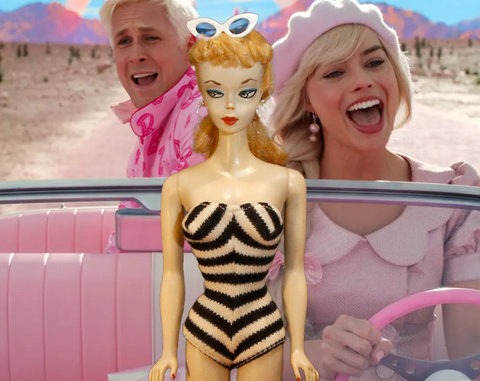
PLEASE NOTE: Mobilized is apolitical. We do not endorse any political party or candidate. However, in these divisive times, we recognize that open discussion is necessary for the resolution of divergent opinions. Consequently, we have added a new section called FORUMS that will host important OPINIONS posted my Mobilized Members. These are the opinions of the members alone and do not represent Mobilized News.
By Michael Caporale
My Ex and I have a great relationship. Mutual respect and intelligence live on far past our marital differences. She is a dyed-in-the-wool feminist, an informed and opinionated authority but unfortunately enamored of the full frontal, overly obvious, feminist message cementing the recent Barbie movie.
I was not so impressed. The basis for her approval lies in the film’s simplistic message, which in her belief was that of Barbie’s originator, Ruth Handler. She maintains that Ruth conceived the doll as a feminist icon simply because her stated purpose was said to be inspirational.
While it is true that Ruth imagined transitioning doll toys from the typical baby-dolls of the period, ones that fostered mothering, to a full-figured grown woman with breasts, it was not until much later that Barbie became a career woman and eventually diversified as a woman of color. Without the slightest degree of cynicism, it’s easy to understand that these changes were a commercial necessity to extend Mattel’s market rather than an altruistic attempt to make the world a better place. Politics has always been a great marketing tool, as the many country and western singers who have increased their fortunes with songs extolling patriotism, usually aired during an unpopular war, can attest.
The original Barbie doll was a model of unrealistic proportions only seen in fashion illustrations of the day. Tall and skinny, with abnormally long legs, a tiny waist and bullet shaped boobs resembling those of Jane Russell in a push up bra, Barbie was, if anything, largely responsible for a wave of body shaming that followed. In 1965 my fifteen-year-old girlfriend would brag that her measurements were 34/23/34, yet with a waist of only a mere 23 inches, she
religiously wore a girdle to further compact her waist. Why?
She grew up with Barbie!
“In her book “Forever Barbie: The Unauthorized Biography of a Living Doll”, author M.G. Lord argued that Barbie is the most potent icon of American culture of the late 20th century. ‘She’s an archetypal female figure, she’s something upon which little girls project their idealized selves,’ she writes. ‘For most baby boomers, she has the same iconic resonance as any female saints, although without the same religious significance.’”
Greta Gerwig, the film’s director is much like a Barbie, in that she is more of a marketable commodity than a director.
Call me old-fashioned but in my day the great directors were Kubrick, Coppola, Spielberg, Bertolucci, Scorsese, Cameron and many others who were bona fide auteurs creating enduring cinematic literature with their original voices. Gerwig’s career was set on a forward path with her breakout film, “Lady Bird,” a trite, sophomoric coming-of-age tale regurgitating the overused, standardized themes of parental conflict and unrequited,
forlorn puppy-love, the universal teen experience with nothing new to be added by Gerwig. It is her fortune that political timing required a marketable commodity by virtue of a more diversified recognition of female directors and, let’s face it, she was the low hanging fruit. But compared to the many truly great women directors that preceded her, people like Mira Nair, Joan Chen, Nora Ephron, Penny Marshall, Sophia Coppola, Jane Campion, Katheryn Bigelow and Ava Duvernay, she pales by comparison.
Further exploration of her career confirms the vapid nature of her direction as simplistic fluff. With her next big film, “Little Women,” she reduces an important piece of literature by modernizing it into a “90210” version palatable to teens who have never seen the inside of a library. Following in the footsteps of Sophia Coppola’s film, “Marie Antoinette,” and Martin Scorsese’s “Goodfellows,” she parrots their successful use of contemporary music to add
energy and meaning to their stories. But in her attempt, it’s no more than pablum fed to infantile children.
She is no less than a contributor to the dumbing of America.
Recently, my opinion of her directorial stature was confirmed when she appeared on the “Late Show” with Stephen Colbert. She floundered in response to his questions, often stammering indecisively to formulate a response. On another night, this was also confirmed (unwittingly) by Billie Eilish who in the telling of the story about how she came to be hired for the film’s theme song, she revealed the same indecisive lack of direction by Gerwig. Yes, the argument can be made that film is a collaborative process, and yes, it was the right thing to give Eilish complete freedom to create, but the manner in which it occurred was more like a default than a direction. To be clear, the only redeemable quality of the Barbie film was Eilish’s song, “What Was I Made For,” deeply poignant, appropriately moody and a tribute to Eilish’s ability to interpret the essence of the Barbie problem in a way that both challenges and confirms the dolls very existence. She is truly brilliant.
In contrast, I have to wonder WTF is Ryan Gosling doing both performing and recording a Christmas version of “I’m Just Ken” as a follow up to the film. Is he riding the coattails of the film’s success or was this a marketing plan he was contracted to? Either way, it’s debasing.
And as befits this tired fairytale, Greta Gerwig was recently elected to be the President of the Cannes Film Festival Jury… and they all lived happily ever after.
